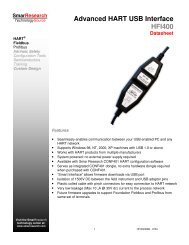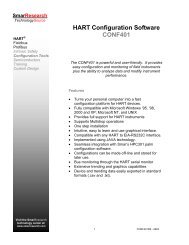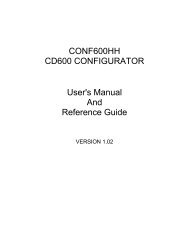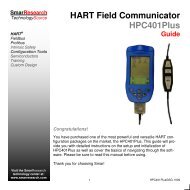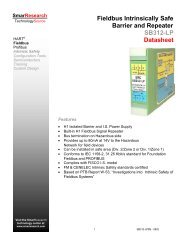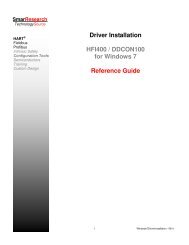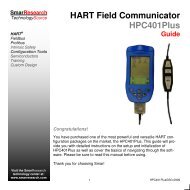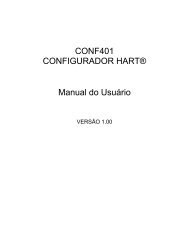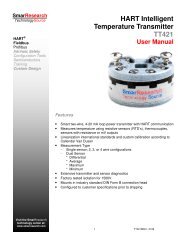HFI400 Software Development Application Notes - smarresearch
HFI400 Software Development Application Notes - smarresearch
HFI400 Software Development Application Notes - smarresearch
You also want an ePaper? Increase the reach of your titles
YUMPU automatically turns print PDFs into web optimized ePapers that Google loves.
Implementation<br />
In the previous section, the <strong>HFI400</strong> DLL functions and variables were explained. In this section, sample<br />
code will further clarify how these commands are used together to fully implement the <strong>HFI400</strong> into your<br />
application. In particular, this section will detail a Startup routine for initializing the DLL and <strong>HFI400</strong>, a transmit<br />
routine for sending a HART command to a device and receiving the response, and local management<br />
call, a read full message monitor of the HART line, and a termination of the <strong>HFI400</strong> connection routine. The<br />
files <strong>HFI400</strong>.h and <strong>HFI400</strong>exApp.cpp, included with this document, also contain sample code to be used in<br />
aiding the development of your application. <strong>HFI400</strong>.h should be included in any project using the <strong>HFI400</strong><br />
DLL functions.<br />
Startup<br />
At the start of the application, or before beginning communication with the <strong>HFI400</strong>, the <strong>HFI400</strong> DLL must<br />
be explicitly loaded and communication with the <strong>HFI400</strong> must be established. In addition, it is recommended<br />
that the data link layer properties of the <strong>HFI400</strong> be set at this time. Setting these properties at<br />
startup is not required and can be done at any time. The default values of the <strong>HFI400</strong> can be seen in Table<br />
4. A sample startup routine in pseudo code is shown below.<br />
#include "<strong>HFI400</strong>.h"<br />
HINSTANCE hDLL=NULL;<br />
HANDLE hfi_h=NULL;<br />
// Handle to the <strong>HFI400</strong>.dll library<br />
//Handle to the actual <strong>HFI400</strong> interface<br />
typedef RECEIVESTRUCT (* HFITREQUEST)(HANDLE,int,unsigned char*,unsigned char,unsigned<br />
char,unsigned char* );<br />
HFITREQUEST hfitransmitrequest; //Function pointer<br />
<strong>HFI400</strong> <strong>Application</strong> <strong>Notes</strong><br />
typedef HANDLE (* HFIOPEN)(int);<br />
HFIOPEN hfiopen;<br />
typedef void (* HFICLOSE)(HANDLE);<br />
HFICLOSE hficlose;<br />
//Function pointer<br />
//Function pointer<br />
typedef RECEIVESTRUCT (* HFIFMESSAGE)(HANDLE);<br />
HFIFMESSAGE hfireadfullmessage; //Function pointer<br />
typedef BOOL (*HFILM)(HANDLE, unsigned char,unsigned char);<br />
HFILM hfilocalmanagement;<br />
//Function pointer<br />
//LOAD <strong>HFI400</strong>.DLL FUNCTIONS<br />
hDLL = LoadLibrary("<strong>HFI400</strong>");<br />
if (hDLL != NULL)<br />
{<br />
//<strong>HFI400</strong> loaded sucessfully<br />
//get references for the functions defined on the DLL<br />
hfitransmitrequest = (HFITREQUEST)GetProcAddress(hDLL, "hfiTransmitRequest");<br />
hfiopen = (HFIOPEN)GetProcAddress(hDLL, "hfiOpen");<br />
hfireadfullmessage = (HFIFMESSAGE)GetProcAddress(hDLL, "hfiReadFullMessage");<br />
hfilocalmanagement = (HFILM)GetProcAddress(hDLL, "hfiLocalManagement");<br />
hficlose = (HFICLOSE)GetProcAddress(hDLL, "hfiClose");<br />
}<br />
else<br />
if (hfitransmit==NULL || hfiopen==NULL || hfilocalmanagement==NULL<br />
|| hfifullmessage==NULL || hficlose==NULL)<br />
{<br />
printf("one or more specified procedure could not be found,\n");<br />
printf("please check if you have the latest <strong>HFI400</strong> DLL version\n");<br />
//add any error handling here<br />
FreeLibrary(hDLL);<br />
return 0;<br />
//return an error code<br />
}<br />
//<strong>HFI400</strong> DLL library not found. Check if <strong>HFI400</strong>.DLL is on path<br />
//OPEN CONNECTION WITH DFI400<br />
hfi_h = hfiopen(0); //open a connection to the <strong>HFI400</strong> at address 0<br />
if(hfi_h == NULL){<br />
//no connection found<br />
printf("could not establish connection to the <strong>HFI400</strong> at address 0 \n");<br />
printf("please check if <strong>HFI400</strong> is connected to the USB port or enabled.\n");<br />
return 0;}<br />
//return an error code<br />
© Smar Research Corporation 9 <strong>HFI400</strong>DLLAPP - 0504



